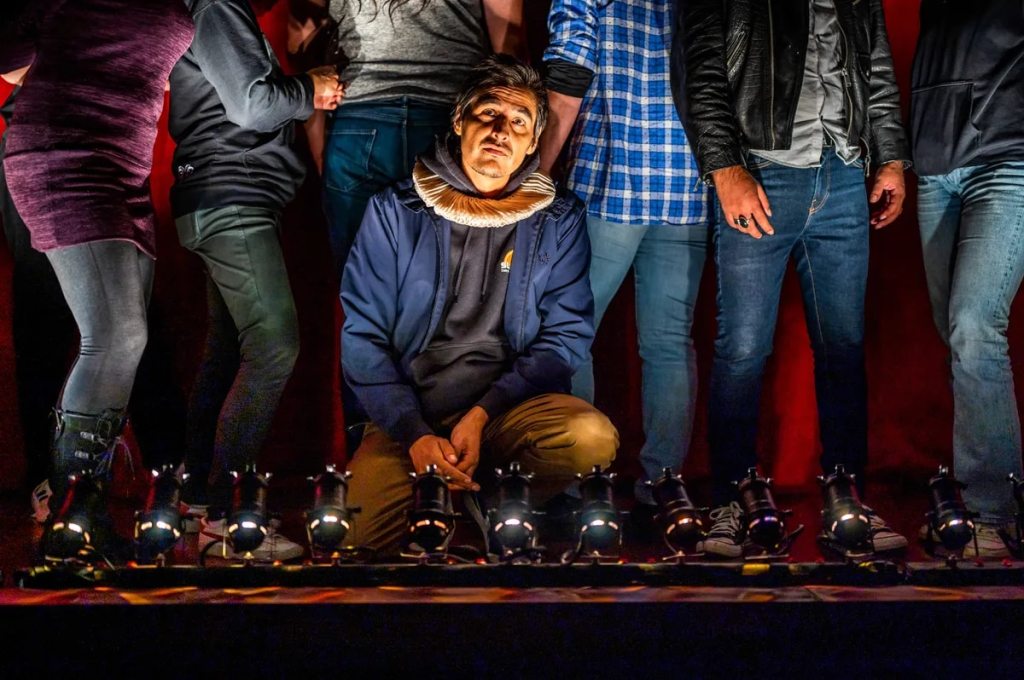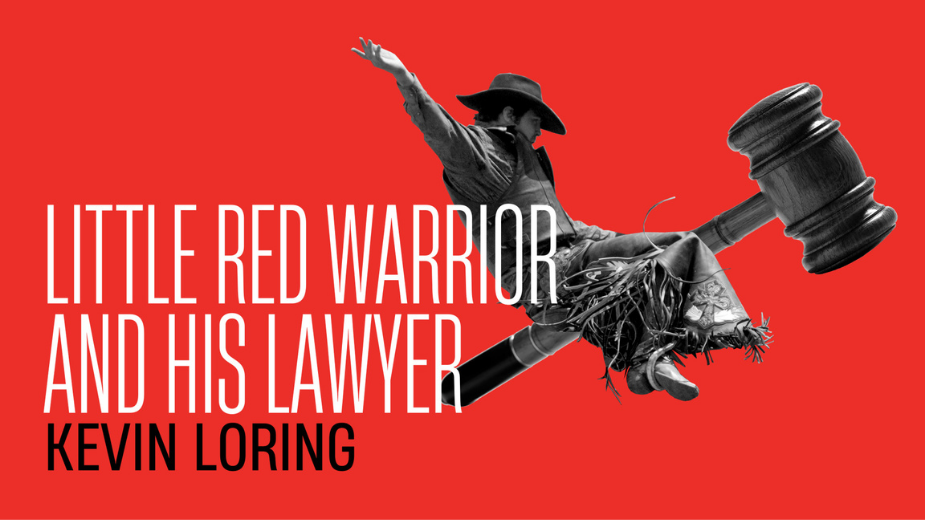
(Dahlia Katz/Crow’s Theatre)
Over the past week, I’ve had the chance to see two brand new Indigenous plays, one in Vancouver and one here, opening this past week at the Belfry Theatre. The first show was Cliff Cardinal’s William Shakespeare’s As You Like It: A Radical Retelling by Cliff Cardinal performed as part of the PuSH Festival. This play was originally titled The Land Acknowledgment which may tip you off to the fact (spoiler alert) that there was no Shakespeare seen or heard in this 90 minute monologue. The show premiered in September of last year at Toronto’s Crow’s Theatre. About 10 minutes in, standing in front of the curtain, dressed casually in a bomber jacket and khaki pants, Cardinal tells the audience this fact, letting them know they can leave and get a refund at the box office if they are unhappy with the revelation. A couple near us in the balcony at the York Theatre did in fact get up and go, but everyone else stayed put, wisely. For Cardinal, who is a most appealing performer (I saw his previous one-man show Huff twice in Victoria and was blown away both times), walks his mostly white audience through the litany of issues facing Indigenous communities today; land claims, missing and murdered Indigenous women, residential schools and allyship. Throughout, he walks a delicate tightrope between humour and anger, making the audience laugh even when telling tough truths. There are moments when his emotions seem to get the best of him (although this could simply be good acting), as when he talks about having to walk his sister to the store to keep her safe, or when he talks about the pedophilic priests and nuns who caused so much suffering and death in residential schools. He ends the show with an encompassing call of “All my relations” reminding us how inextricably interconnected we all are, like it or not. And he mouths to the audience, while taking his second standing ovation curtain call, “Are we friends? Are we friends?” Yes, Cliff, I’d be proud to call you a friend, and will deepen my commitment to being a better ally to Indigenous peoples as result of seeing this show. As you like it, indeed.

This week saw the delayed opening of Kevin Loring’s Little Red Warrior and his Lawyer at the Belfry Theatre. Opening was delayed by a week due to the lead actor Sam Bob getting injured during a rehearsal. He is fine, and is now back on stage, but the company had to bring in an understudy, Gordon Patrick Price, who learned his role in less than a week and stepped on stage for the first time last Tuesday night, the night I managed to snag two of the very few remaining tickets left (the show is now sold out, but can be watched online). Price will perform the matinees for the remainder of the run.
Now to the play itself, directed by Loring in a co-production with Savage Society in Vancouver and the National Arts Centre’s Indigenous Theatre (where Loring is Artistic Director). The production will go on to performances in Vancouver in March then to the NAC in future. The show will not be everyone’s cup of tea, that’s for sure. The comedy is very broad, at times physical, and although the satire is pointed in places, there is a lot here that felt to me like actors working extremely hard to not huge effect. The plot tells us that a housing development is being built on the traditional territory of Little Red Warrior, the last of his people. He teams up with a lawyer (Shekhar Paleja) who then fights his land claim case right up to the Supreme Court. Little Red moves in to Larry’s home for the duration, and is set upon by Larry’s wife Desdemona (Luisa Jojic) who seduces him into an affair. Kevin McNulty plays the narrator as a homeless man (why?) and multiple other roles with a quiet humour, and there is a surprise additional character who makes a splashy entrance late in the play. The ensemble works well together, but are asked to stretch the believability of their characters to the point that for me they felt flat rather than three dimensional. But there is a nice twist in the final moments of Loring’s comedy (spoiler alert) that reflects the reality that economic interests sometimes trump land protection, even in Indigenous communities.
The set design by John Doucet provides a backdrop of various sizes of bamboo poles, indicating both a forested mountain valley and perhaps a symbol of urban sprawl. But I found that it hemmed the actors in too much, reducing their playing space on the already small Belfry stage. Overall, Loring’s play offers some chuckles along the way, but does not compare with his Governor General’s Award winning play Where the Blood Mixes, or to either of Cardinal’s more pointed and powerful pieces.